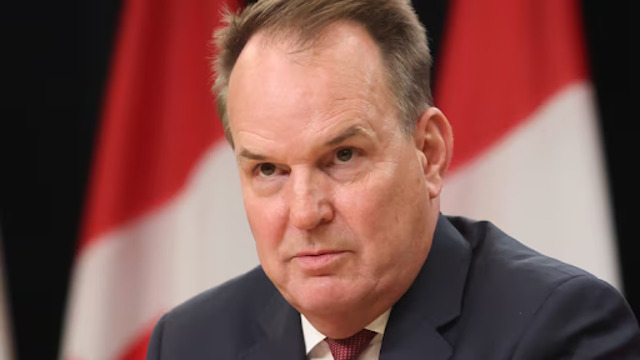
Labour Minister Steven MacKinnon is shown here speaking at a press conference in Ottawa on Aug. 22. On Friday, he announced he was involving the industrial relations board in the Canada Post strike. (Patrick Doyle/The Canadian Press)
Labour Minister Steven MacKinnon has referred the ongoing labour dispute between Canada Post and the Canadian Union of Postal Workers (CUPW) to the Canada Industrial Relations Board (CIRB). MacKinnon announced Friday that if the CIRB determines that negotiations have reached an impasse, it will be instructed to order striking CUPW members to return to work under the existing collective agreement until May 22, 2025.
MacKinnon expressed frustration over the prolonged strike, which has lasted more than four weeks, acknowledging that Canadians are "rightly fed up" with the disruption. He emphasized that the CIRB, an independent body, would make its own determination on the matter and, if aligned with his stance, could order a return to work as early as next week.
The labour minister noted that a federal mediator had informed him that the negotiations were heading in the wrong direction, prompting his decision. “I am making this decision to protect the interests of all Canadians,” MacKinnon said. “It is not a decision I take lightly, but in this situation, it is the right one.” Additionally, MacKinnon announced the creation of an industrial inquiry commission to investigate why talks between the two parties have failed. The commission, led by experienced labour negotiator William Kaplan, is tasked with delivering a report by May 15, 2025, offering suggestions to help resolve the dispute.
Kaplan, a former University of Ottawa law professor and seasoned arbitrator, was appointed for his independence and expertise in resolving complex labour conflicts. The commission will take a broad approach, examining Canada Post’s structure from both customer and business perspectives.
In response, CUPW fiercely condemned the minister’s intervention, describing it as an assault on their right to collectively bargain and strike. The union stated it is reviewing the decision and exploring its next steps. "Postal workers are being forced to return to work without new negotiated collective agreements," the CUPW said, indicating that the board may order a return to work if it deems the parties deadlocked.
Canada Post employee Aurelia Arcaro of Rigaud, Que., is one of 55,000 unionized employees that have been on strike since Nov. 15. (Sean Kilpatrick/The Canadian Press)
The strike, which began on November 15, escalated after federal mediation was suspended on November 27, as the mediator concluded that the two sides were too far apart. CUPW negotiators met with Canada Post on Monday, marking the first talks since the mediation suspension. The union has presented a set of demands, including wage increases, a cost-of-living allowance, additional medical and personal leave days, and improved rights for temporary workers. However, CUPW national president Jan Simpson accused Canada Post of stalling in hopes of federal intervention.
In a statement, Canada Post expressed disappointment with the union’s revised offer, saying the union had either reverted to previous positions or raised its demands. The Crown corporation cited the financial strain caused by the strike, which involves 55,000 postal workers, as exacerbating its already challenging situation.
Canada Post also stated that it is reviewing MacKinnon’s announcement and will act swiftly to support the process as directed by the minister. The corporation reiterated its commitment to negotiating agreements that would better serve Canadians and ensure good jobs for its employees.
The Canadian Federation of Independent Business (CFIB) welcomed the government’s intervention, though it lamented that the move comes too late to salvage the crucial holiday season for small businesses. CFIB president Dan Kelly noted that small firms have been losing an estimated $100 million per day due to the strike, totaling around $1.6 billion since it began. The union’s ongoing picket lines, meanwhile, remain firm as workers continue to push for better wages, benefits, and working conditions.















